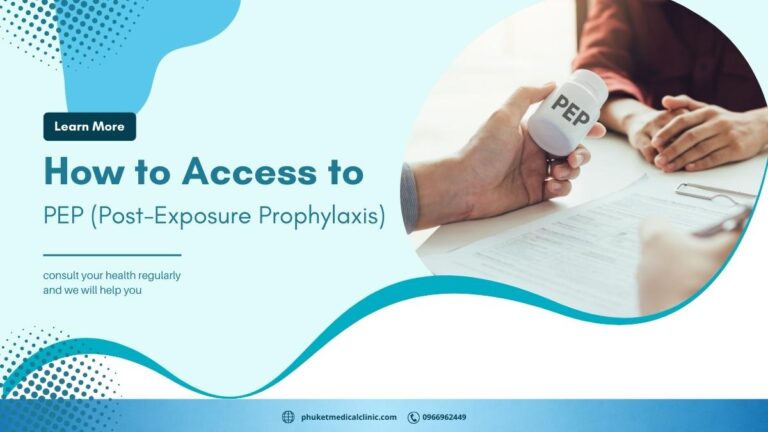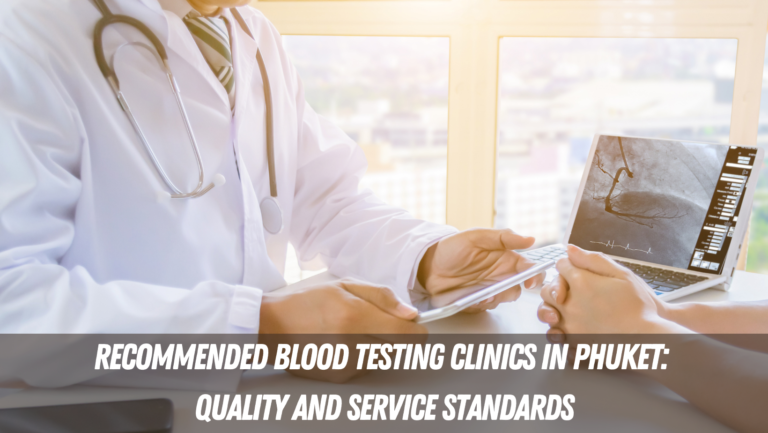PEP (Post-Exposure Prophylaxis) is a medication used to prevent disease after exposure to the HIV virus. It is a preventive treatment aimed at reducing the risk of infection after a potential exposure. It involves taking antiretroviral medication within a specified time frame. PEP is recommended by healthcare professionals for individuals who have engaged in unprotected sexual intercourse, experienced sexual assault, or been accidentally exposed through needlestick injuries, particularly for medical personnel. PEP works by suppressing the replication of the HIV virus in the body, preventing it from establishing a widespread infection. Its effectiveness is highest when started within 72 hours after exposure. The earlier the treatment is initiated, the greater the chances of preventing HIV infection.
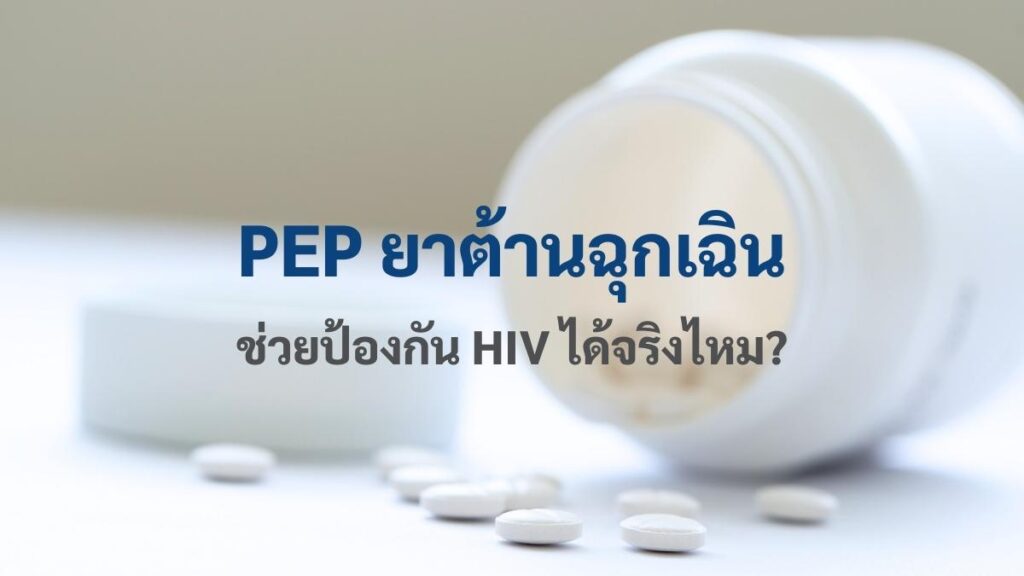
Introducing PEP (Post-Exposure Prophylaxis)
PEP, or Post-Exposure Prophylaxis, is a type of medication used to combat the HIV virus. It consists of a combination of three drugs: Tenofovir (TDF) at a dose of 300 mg, Emtricitabine (FTC) at a dose of 200 mg, and Dolutegravir (DTG) at a dose of 50 mg. There are also other additional drug formulations available. Before starting PEP medication, individuals at risk must consult with a healthcare professional to determine the most appropriate drug regimen.
- Individuals at risk should promptly take PEP medication as soon as possible and within 72 hours from the time of exposure to ensure the medication can take effect in a timely manner. This is because the HIV virus has a rapid ability to replicate and multiply. Research has shown that once the virus enters the human body, it can rapidly grow and divide within as little as 24-36 hours. If the viral load is high, delaying the administration of PEP medication may not be effective.
- Individuals taking PEP medication must not miss any doses and should take the medication as prescribed by their healthcare provider for a full duration of 28 days. It is essential to take the medication at the same time every day.
- Healthcare providers must consider the individual’s history of exposure to HIV, ranging from low to high risk. During the period of taking PEP medication, there should be no additional risk of exposure.
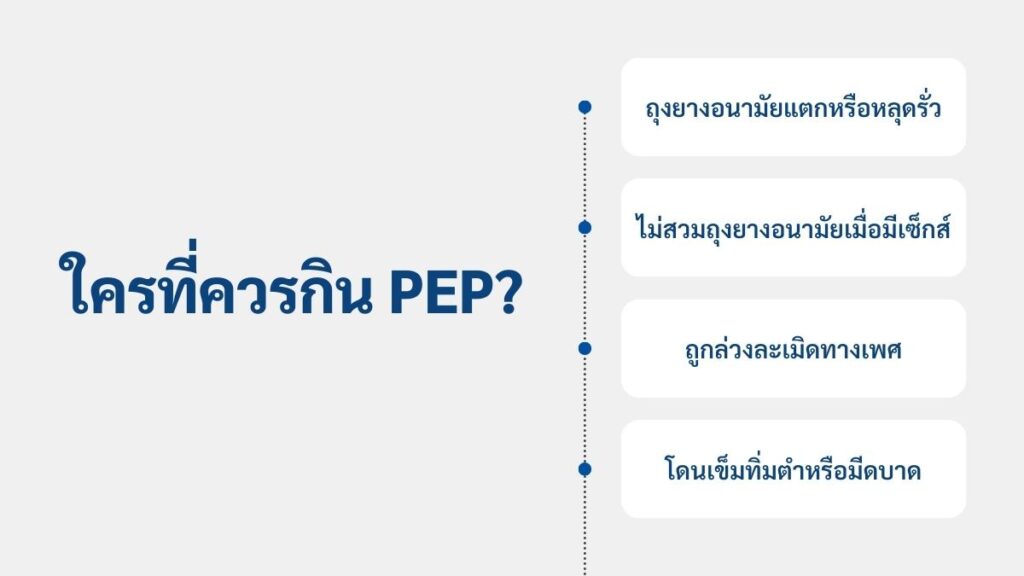
Who should take PEP medication?
- Individuals who engage in unprotected sexual intercourse with a partner whose HIV status is unknown or with casual partners.
- Individuals who experienced condom breakage or slippage during sexual intercourse, even if they were initially using condoms.
- Individuals who share needles or drug paraphernalia with others, especially in the case of injecting drugs into the bloodstream.
- Individuals who have had sexual intercourse while under the influence of substances, intoxicated, or in a state of diminished consciousness or impaired judgment.
- Individuals who have experienced needlestick injuries, cuts from surgical instruments, or accidental exposure to medical devices without intentional self-harm.
What are the steps before taking PEP medication?
If you have experienced any of the aforementioned situations, it is important to remain calm, cease any sexual activities immediately, and promptly consult a healthcare professional. If you are in Phuket province, you can contact us at Phuket Medical Clinic to receive PEP (Post-Exposure Prophylaxis) medication. We are ready to provide fast and reliable service, ensuring that you receive the medication on time. Click here to make an online appointment. During your visit, the doctor will thoroughly assess your risk history and screen for HIV infection that may have resulted from previous exposures (not the current one), in order to ensure that you are not already infected. Additionally, liver and kidney function tests will be conducted. If the person at risk is female, a pregnancy test and screening for other sexually transmitted infections will also be ordered to determine if PEP medication is suitable for you. Once all the results indicate that you can start taking PEP, the doctor will prescribe the medication and explain the instructions and details, including potential side effects. It is crucial to begin taking the medication as soon as possible and not exceed 72 hours since the exposure. Then, continue taking the medication consistently for a duration of 28 days, at the same time every day, to ensure the effectiveness of HIV treatment.
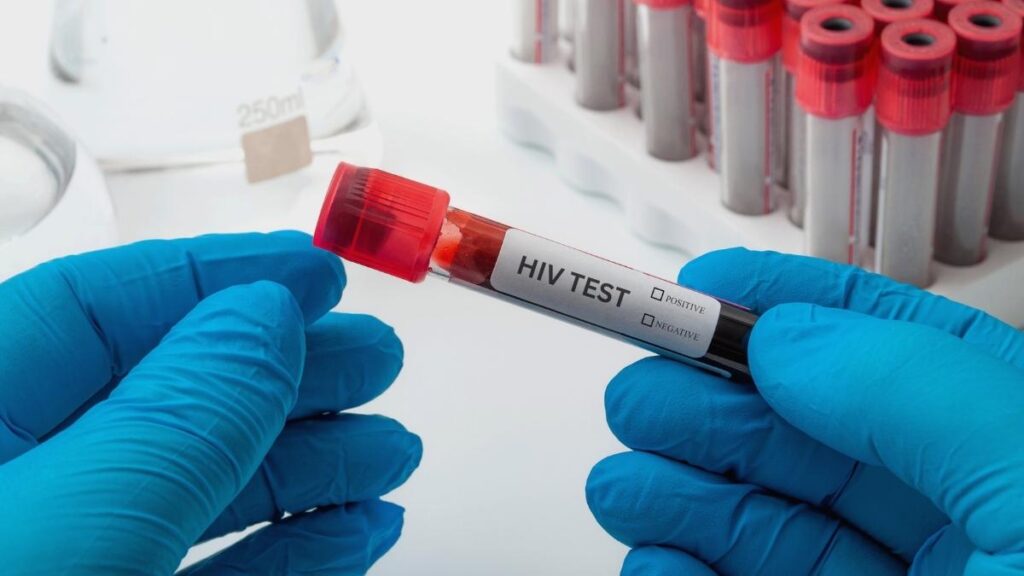
How should I behave during the period of taking PEP medication?
During the period of taking PEP medication, if it is possible to avoid engaging in sexual activities, it is advisable to abstain. This is because there is a risk of transmitting the infection to your partner or acquiring new infections. However, if abstinence is not feasible, it is important to use condoms consistently and correctly. Prior to use, inspect the condom for any leaks or damages to ensure its quality. Additionally, make sure the condom is not expired to effectively protect yourself from potential risks. It is also recommended to refrain from donating blood during this time.
In terms of side effects of PEP (Post-Exposure Prophylaxis) medication, nowadays there are minimal side effects. Common symptoms that may occur during the first 1-2 weeks of starting the medication include headache, fatigue, diarrhea, nausea, and dizziness. However, these symptoms typically subside on their own. It’s important to note that PEP is only taken for a short period of time, so there is no need to worry about long-term side effects. However, if you experience severe or unusual symptoms, it is important to seek medical attention immediately.
After completing the PEP course, what should you do next?
If you have completed the course of medication, please return to see your doctor as scheduled for another HIV test. The doctor may schedule additional tests approximately 90 days after completing the medication to confirm the effectiveness of the treatment. The follow-up appointment after completing PEP is crucial to check if the medication has been successful. Individuals who have taken PEP should have regular blood tests and assess their ongoing risk. If there is still a tendency to engage in risky behavior, it is advisable to consult with a healthcare provider to explore prevention methods or consider starting PrEP (Pre-Exposure Prophylaxis) before potential exposure. PrEP is a more suitable option for long-term prevention.

Misunderstandings about PEP medication
- PEP can treat HIV.
- PEP is not a treatment for HIV, but it is a preventive measure taken within 72 hours after potential exposure to reduce the risk of HIV infection. However, it cannot eliminate the virus if someone is already infected.
- PEP is 100% effective.
- Although PEP can reduce the risk of HIV transmission, it is not 100% effective. Its effectiveness depends on various factors, including the timing of initiation and adherence to the prescribed treatment regimen as directed by a healthcare professional.
- PEP can prevent other sexually transmitted infections.
- PEP is specifically designed to prevent HIV infection and does not protect against other sexually transmitted infections. The use of condoms remains necessary to reduce the risk of contracting other sexually transmitted diseases.
- PEP is used to prevent HIV over time.
- PEP is not meant to be used as a continuous method for HIV prevention. It is specifically intended for emergency situations following potential exposure to HIV. It should not be used as a regular form of HIV prevention. For ongoing prevention, it is more appropriate to consider using PrEP (Pre-Exposure Prophylaxis).
- PEP cannot be purchased without a prescription.
- PEP is not available for sale at pharmacies. If you need to take PEP, you must consult a healthcare professional at a medical facility. The healthcare professional will assess your level of risk and may need to perform blood tests before prescribing the medication.
- Take PEP at any time if you are at risk.
- PEP is most effective when taken as soon as possible after exposure. It is recommended to take PEP within 72 hours of the potential exposure. Delaying or missing doses may reduce the effectiveness of the medication.
Read more interesting articles
In summary, PEP (Post-Exposure Prophylaxis) is an important tool for preventing the transmission of HIV in cases of recent exposure. It is a short-term regimen of HIV antiviral medication taken for approximately 28 days to suppress the replication of the virus in the body. However, it is crucial to understand that PEP is not 100% effective for everyone and should not be used as a substitute for other preventive measures such as consistent condom use, safe sexual practices, and considering pre-exposure prophylaxis (PrEP) as a continuous and highly effective prevention method. These measures can help keep you far away from the risks of contracting the disease.



